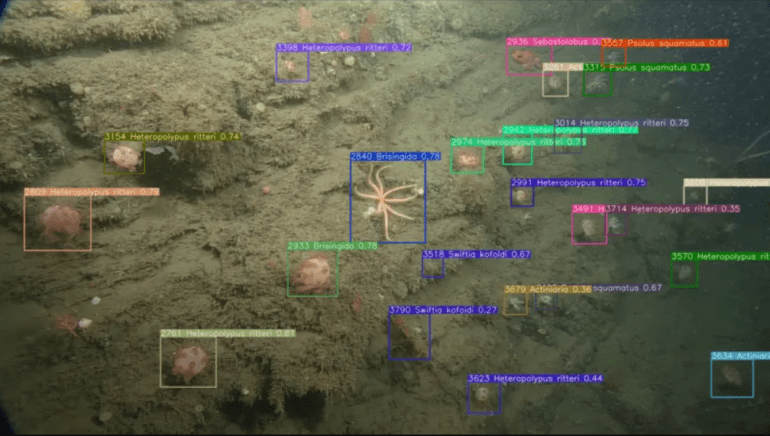TL;DR:
- MBARI’s FathomVerse app engages users in classifying marine life through gamification.
- Ocean Vision AI project includes FathomNet, a data repository, and an AI portal for oceanic image analysis.
- The initiative bridges the gap between experts and enthusiasts, fostering collaboration in ocean research.
- The potential success of FathomVerse could extend to exploring life in space.
- This innovation accelerates marine data processing, benefiting industries like ocean exploration and aquaculture.
Main AI News:
In the vast expanse of our oceans, countless mysteries remain hidden beneath the surface. The diversity of marine life is staggering, from the elusive fanfin anglerfish to the captivating flapjack octopus. While marine researchers have amassed a treasure trove of photos and videos over the years, deciphering this visual data has always been a Herculean task, undertaken painstakingly by expert scientists.
Enter the Monterey Bay Aquarium Research Institute (MBARI), headquartered in Moss Landing, which has embarked on a transformative mission to harness the power of artificial intelligence and engage gamers in the pursuit of oceanic knowledge. This summer, MBARI unveiled FathomVerse, a groundbreaking game app that immerses users in an underwater world teeming with tasks and missions.
As users navigate this digital ocean, they encounter enigmatic orbs of light that, upon illumination, reveal marine creatures. The unique twist lies in the user’s role as a classifier of these creatures, thereby contributing to the training of machine learning algorithms. Ultimately, this innovative approach aims to expedite the analysis of colossal volumes of aquatic visual data, unveiling the ocean’s secrets and bolstering our understanding of environmental and biological impacts on activities such as ocean exploration, offshore wind, deep-sea mining, and aquaculture.
Claudie Beaulieu, an assistant professor in the Ocean Sciences Department at UC Santa Cruz, underscores the potential of this project: “The project could be a game-changer in how marine life is monitored. Visual data in the ocean takes a lot of time and effort to process and is usually labeled manually by experts. Using AI to process it is so much faster, and means a lot of data is available for research and monitoring.”
Ocean Vision AI: A Three-Pronged Initiative
FathomVerse is just one facet of a more extensive initiative named Ocean Vision AI, a program dedicated to making visual data and analysis tools more accessible to researchers. Funded by a $5 million grant from the National Science Foundation’s Convergence Accelerator program, Ocean Vision AI comprises three components: FathomNet, the repository for vast oceanic image datasets; “the portal,” an AI-powered tool for processing these datasets; and the FathomVerse game app.
Each of these components caters to different audiences, spanning from experts to enthusiasts. Kevin Barnard, a software engineer at MBARI and co-lead on the program, explains, “We’re trying to offer three different products, which capture interactions and offer services on this spectrum of experts to enthusiasts.”
Lilli Carlsen, the project’s engagement coordinator, emphasizes the significance of fostering collaboration between machine learning experts and the ocean research community to address the profound challenges of ocean exploration and stewardship.
FathomNet and the Ocean Vision AI Portal
FathomNet, the repository arm of the project, serves as a hub for consolidating extensive oceanic data. Katija notes, “The ocean is this massive place — you’ve got at least 200,000 animals that have been described as marine species. Plus, whatever we haven’t found yet.” While most data in the repository originates from MBARI, the team aims to expand participation from other sources over time.
Megan Cromwell, assistant chief data officer for NOAA’s National Ocean Service, underscores the pivotal role of artificial intelligence and machine learning in managing ocean image data. She emphasizes, “The entire ocean image community needs this for one reason or another, whether it be for the analysis and quantification or to make the data available and easy to use.”
FathomVerse: Bridging the Gap
While FathomNet and the portal cater to experts, MBARI is keen to harness the expertise and enthusiasm of the wider public. FathomVerse, developed in partnership with Internet of Elephants and &ranj game development companies, aims to tap into this invaluable resource, fostering inclusivity in ocean research.
Kakani Katija envisions breaking down barriers for the public to engage with ocean science and possibly connect them with real-life expeditions. Beta testing for FathomVerse has recently concluded, with plans to release the full game publicly in the first quarter of 2024.
Intriguingly, this project’s success could serve as a blueprint for exploring life in other frontiers, such as space. Katija envisions a future where robots equipped with AI are sent on missions to seek out unknown life forms, bringing science fiction closer to reality.
Conclusion:
MBARI’s FathomVerse and Ocean Vision AI project revolutionize ocean exploration by harnessing AI and public engagement. This innovation streamlines data analysis, benefiting environmental monitoring, deep-sea industries and potentially expanding to other frontiers like space exploration. The market can expect increased accessibility to oceanic data and a surge in interest from both experts and the public, fostering collaborative advancements in marine science.

